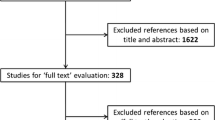Abstract
Background: Percutaneous ethanol injection (PEI) and radio-frequency (RF) ablation are possible palliative treatment modalities for patients with non-resectable liver metastases of colorectal carcinomas. The different techniques are explained and reviewed. Results: PEI did not show promising results for the treatment of liver metastases. RF results were more encouraging; some studies showed improved mean survival times for patients when a complete necrosis of the metastases could be achieved. The maximum diameter of the necrotic area possible in a single session is about 5 cm. Conclusion: PEI and RF are palliative last-line treatment strategies for patients with non-resectable liver metastases and should only be applied if chemotherapy is not sufficient or not possible. The long-term efficacy of RF ablation in this group of patients has to be evaluated.
Similar content being viewed by others
Author information
Authors and Affiliations
Additional information
Received: 10 March 1999 Accepted: 29 June 1999
Rights and permissions
About this article
Cite this article
Becker, D., Hänsler, J., Strobel, D. et al. Percutaneous ethanol injection and radio-frequency ablation for the treatment of nonresectable colorectal liver metastases – techniques and results. Langenbeck's Arch Surg 384, 339–343 (1999). https://doi.org/10.1007/PL00008077
Issue Date:
DOI: https://doi.org/10.1007/PL00008077




